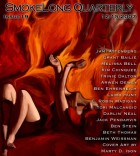Why is the narrator “the child” instead of named?
That wasn’t such an initially conscious decision. This story came to me so fully as the experience within that child and in this short compass taking the time for introductions felt extraneous. She’s so much in the process of becoming.
Talk about your decision to title this story “Red Brick.”
It came to me as an image I remembered, this place where this child is, the bricks making up such a deceptively solid place to live and yet the life within is dissolving and the sameness of all the buildings all around is deceptive as well. Anywhere you enter might change your whole life, or not.
An interesting moment occurs when the child enters the wrong apartment. What does this switch in reality accomplish?
It has to do with that deceptive sameness and as she enters any of her certainty is further diminished. And yet there are wonders even in that strange room, those old men reaching out, and that delightful gift of touching a puppy.
Tell us about guest editing for Mississippi Review.
I still grieve good stories I ran out of room for. Having a theme for that issue—the hyperextended family, meaning nontraditional families and families that include animals—well that worked on me in an interesting way. I was struck by how similar the process was to editing and compiling my own collection of stories, how stories and images within them kept waking me up at night and forming into a whole. Even though there were longer stories included, I think the issue being online pushed my choices often to shorter pieces and pieces maybe more untraditional at times. I found out that I admire quite a range of forms of storytelling. My choices ended up so varied with gorgeous voices in so many of the pieces, I thought, like Jana Martin’s. If I start naming names, this will be a long answer. But I will say I kept thinking about birds at night, or chickens walking around, and that Jeff Landon is a funny and heartbreaking genius.
SLQ completed issue 18 at the close of summer and launched this issue, 19, on the threshold of winter. During the three months in between, the crops were harvested, the leaves fell, the rain returned, temperatures dropped, darkness lengthened. Death in increments. How does the turning of the seasons affect your “muse,” your inspiration?
Not as much as I wish it could. I’ve spent so much of my life moving, 13 different grade schools, and now since my doctorate all these temporary jobs teaching. When my daughter was young, I looked forward to writing in summer. Now it seems every summer I’m packing up and heading for a new town. I can’t wait until I find a permanent home and can let those changes stretch out before me in a more familiar way. Right now I’m always in a new place and though I know the changes affect me, it’s hard to articulate how. I better feel the changes brought on in a month by the moon. I love to write when it rains or closed in somewhere on a snowy day. I like to watch the leaves turning outside my window now.



 The core workshop of SmokeLong Fitness is all in writing, so you can take part from anywhere at anytime. We are excited about creating a supportive, consistent and structured environment for flash writers to work on their craft in a community. We are thrilled and proud to say that our workshop participants have won, placed, or been listed in every major flash competition. Community works.
The core workshop of SmokeLong Fitness is all in writing, so you can take part from anywhere at anytime. We are excited about creating a supportive, consistent and structured environment for flash writers to work on their craft in a community. We are thrilled and proud to say that our workshop participants have won, placed, or been listed in every major flash competition. Community works.